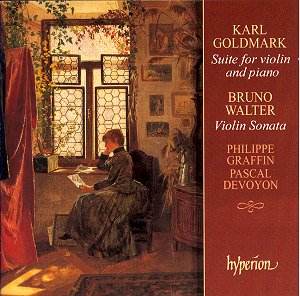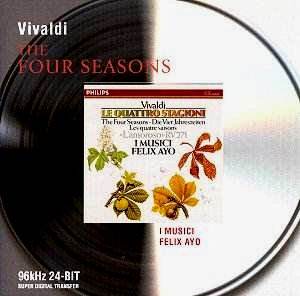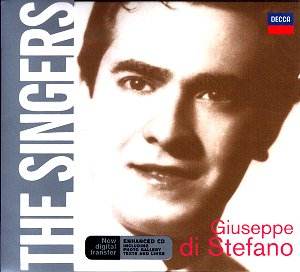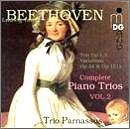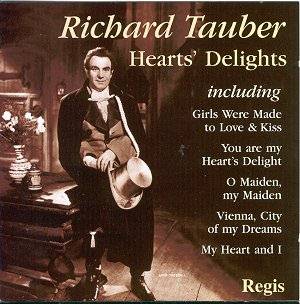 Composer: Richard Tauber
Composer: Richard Tauber
Works: 1. You are my heart’s delight (from ‘The Land of Smiles’), 2. Girls were made to love and kiss (from ‘Paganini’), 3. O maiden, my maiden (from ‘Frderica’), 4. Merry Widow Waltz (from ‘The Merry Widow’), 5. Serenade (from ‘Frasquita’), 6. Patiently smiling (from ‘The Land of Smiles’), 7. Vienna city of my dreams (Sieczynski/Lockton), 8. Don’t be cross (from ‘Der Obersteiger’), 9. Roses from the South (J. Strauss II), 10. I’m in love with Vienna (from ‘The Great Waltz’), 11. One day when we were young (from ‘The Great Waltz’), 12. Only a rose (from ‘The Vagabond King’), 13. Waltz of my heart (from ‘The Dancing Years’), 14. Nightingale song (from ‘Der Vogelhändler’), 15. Serenade (Schubert), 16. Kommt a Vogerl geflogen (Trad.), 17. Your love could be everything (from ‘Old Chelsea’), 18. Liebe kleine Nachtigall (Moszkowski), 19. Simple little melody (from ‘Land Without Music’), 20. My heart and I (from ‘Old Chelsea’), 21. You mean the world to me (from ‘The Singing Dream’), 22. One night of love (from ‘One Night of Love’), 23. Komm Zigan (from ‘Countess Maritza’), 24. Goodbye (from ‘The White Horse Inn’)
Performers: Richard Tauber (tenor), with conductors Henry Goehl (tracks 6, 8, 12, 17, 20), Gustav Walter (tracks 19, 22), Frieder Weissmann (tracks 23, 24)
Recording: REGIS RRC 1066 [74:44]
Label: Regis
Richard Tauber, the illustrious tenor whose career blossomed in the early 20th century, occupies a unique niche within the pantheon of vocal artistry. His recordings, particularly those from the 1930s and 1940s, represent a confluence of operatic prowess and popular song, creating a bridge that resonates with both classical and light music audiences. The compilation “Heart’s Delights” offers a generous selection of Tauber’s most beloved works, showcasing his ability to evoke deep emotion while navigating the lighter repertoire that often drew critical scorn for its perceived frivolity.
The opening track, “You are my heart’s delight” from The Land of Smiles, serves as a quintessential example of Tauber’s stylistic signature—his ability to imbue a seemingly simple melody with profound warmth and yearning. The nuanced phrasing and delicate dynamic shifts exemplify his mastery of vocal color, particularly notable in the soft half-voice he employs in the refrain of “Girls were made to love and kiss.” This interpretative choice, while perhaps bordering on the camp by today’s standards, is executed with an authenticity that transcends mere sentimentality. Tauber’s voice, unmistakably rich and round, retains a heroic resonance even in these lighter works, particularly in “Mädchen mein Mädchen,” recorded in 1928, where one can still hear the youthful vigor that characterized his early career.
As the collection progresses, the listener is treated to a striking contrast between the buoyant exuberance of the “Merry Widow Waltz” and the wistful nostalgia of “One day when we were young.” Here, Tauber’s interpretation shines through his ability to convey longing through subtle tonal shifts and impeccable breath control. His command over the higher registers, which he had to refine later in his career, is compellingly evident; while there are instances where he resorts to a soft falsetto, such moments are suffused with beauty rather than weakness. The engineering of the recordings, though dated, captures the warmth of Tauber’s voice with surprising fidelity. The background orchestration complements rather than overwhelms, allowing his tenor to float above the lush, melodic lines.
Tauber’s versatility is further highlighted in “Nightingale song” from Der Vogelhändler, where he navigates the intricate melismas with both agility and grace, while “My heart and I” from his own operetta Old Chelsea reveals a more introspective side of his artistry. The poignancy he imbues in this song, despite the aging of his voice by 1943, suggests a deeper emotional connection that resonates powerfully with the listener. His ability to explore the spectrum of human emotion—from joy to melancholy—sets him apart from his contemporaries, making him a pivotal figure in the crossover genre.
The nostalgic thread woven throughout the album reflects not only Tauber’s personal journey as an artist who fled war-torn Europe, but also serves as a reminder of the rich cultural tapestry of the time. The collection resonates with a sense of longing for a pre-war Vienna, a city that defined his early years and artistic identity. His decision to embrace lighter repertoire, often criticized as a compromise, is recontextualized here as a testament to his adaptability and enduring appeal.
This collection is a treasure trove for both ardent fans of Tauber and newcomers alike. Each track is imbued with a vitality that belies its age, and the recordings bear witness to a vocalist whose artistry transcends the boundaries of genre. The emotional depth, technical prowess, and distinctive timbre of Tauber’s voice render “Heart’s Delights” a moving homage to a singular talent whose legacy continues to resonate in the landscape of vocal performance.
